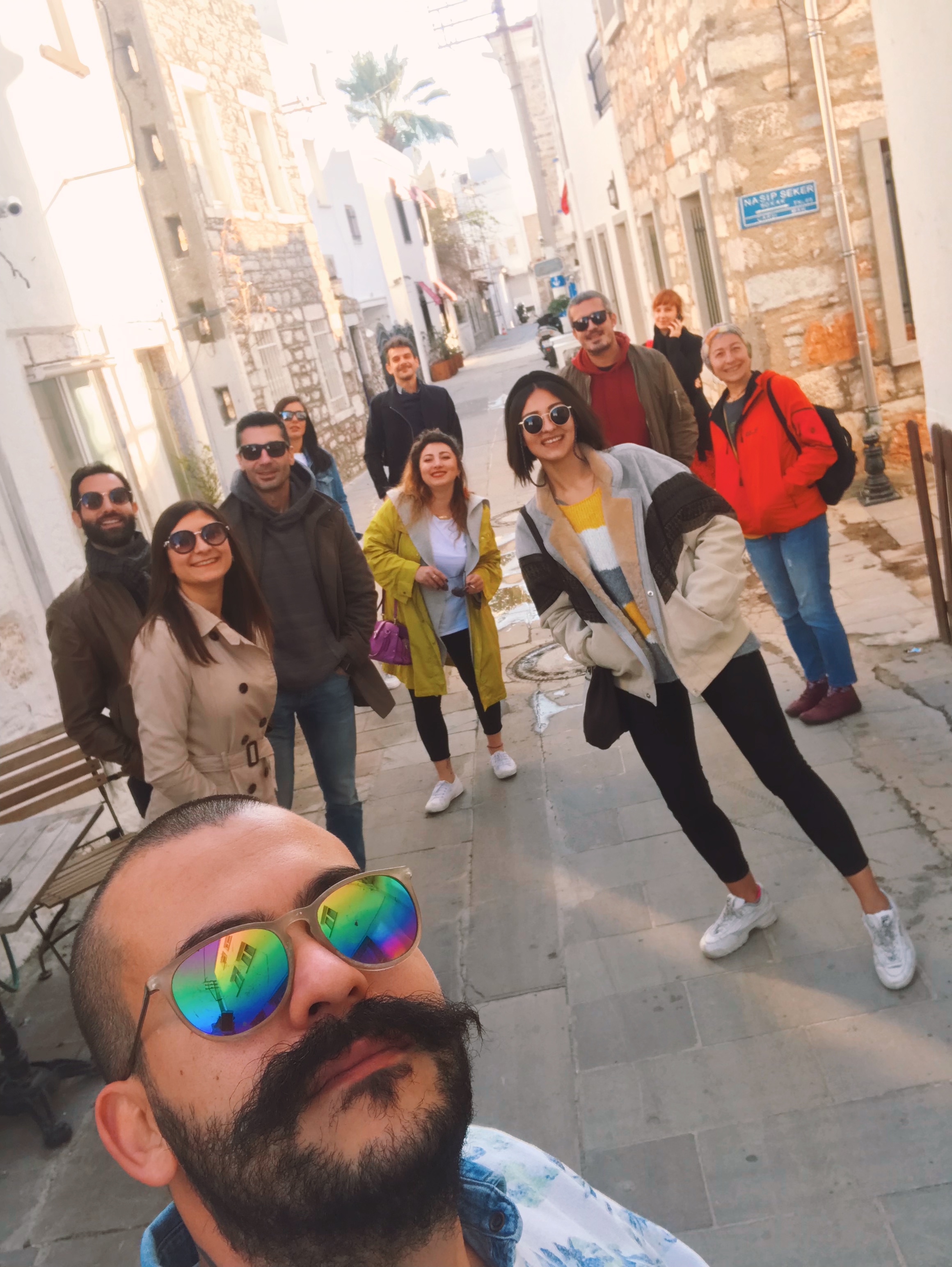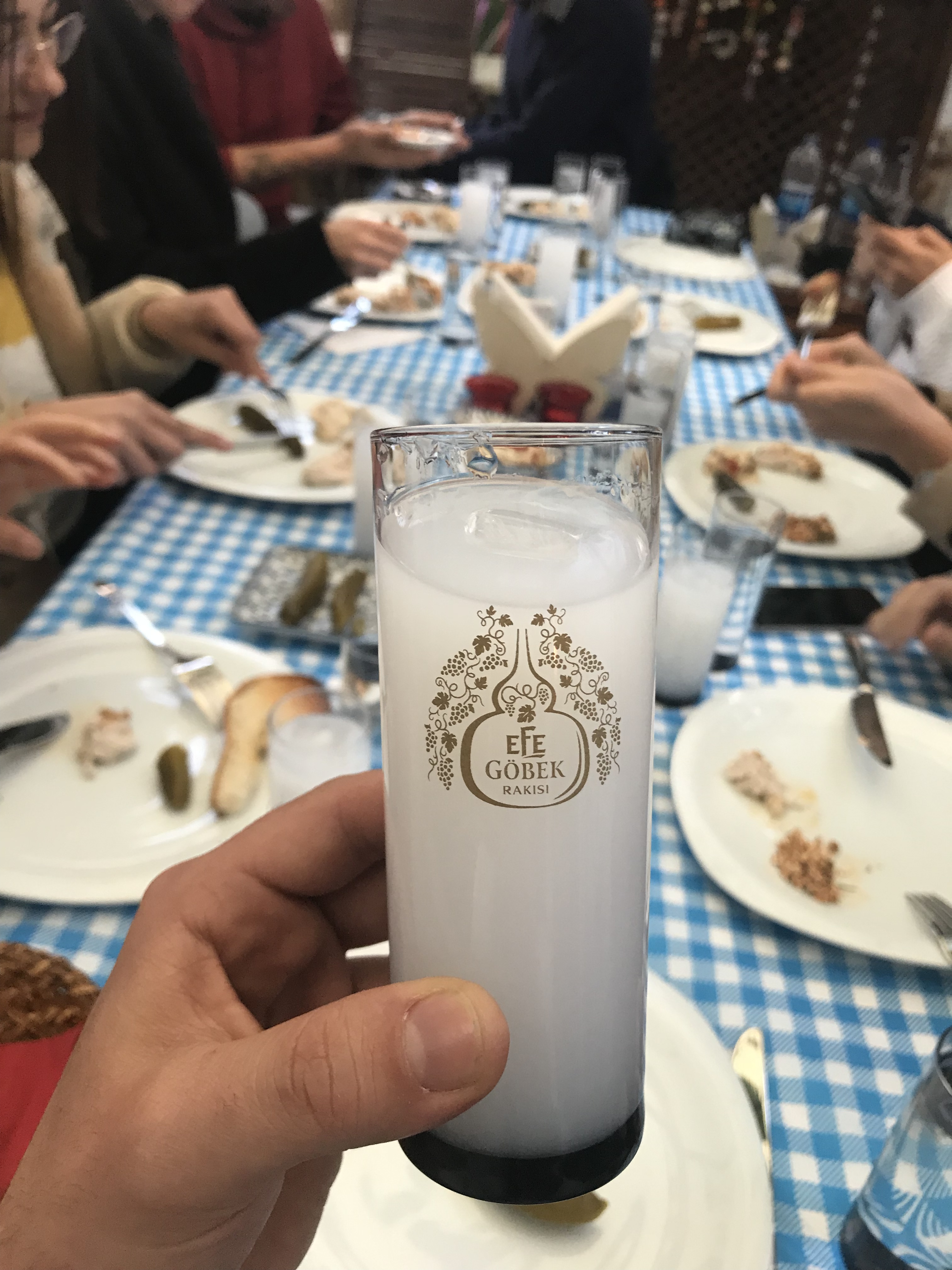
Bodrum’da bu kış nasıl mı geçiyor? Hemen anlatayım.
Bu Bodrum’daki dördüncü kışım ve ilk defa böyle bir soğuk yaşıyorum burada. Çok normal üstü seviyede sert bir kış söz konusu ve hiç hazırlıklı değildik, değildim, hala da hazır olduğumdan emin değilim. Uyum sağlamaya çalışıyoruz ama bir yandan da uyum sağlamayı da kabul etmek istemediğimizden iki arada bir deredeyiz. Şömineler, sobalar, elektrikli ısıtıcılar, ateş yakılan tenekeler bu ara bizim bebeklerimiz, hepsini ayrı ayrı çok seviyoruz.
Bodrum çılgın kalabalıktan uzakta, ülke içinde minik pembe bir baloncuk olarak varlığını sürdürürken bunu, burayı yaşayabiliyor olmak çok güzel. Ben kışını ayrı seviyorum Bodrum’un, her yer daha benimmiş gibi hissediyorum. Yaz kalabalığında denk gelemeyeceğimiz insanlarla bir araya gelebiliyoruz. Genelde istediğimiz her yerde spontane gidip sandalye bulabiliyoruz. Temel rutinler gelişiyor, o rutinler bazen küçük bazen büyük sürprizlerle, heyecanlarla çeşnileniyor. Kendi insanların, kendi mekanların oluyor zamanla ve işte o zaman çok keyifli oluyor.
Bodrum’da benim bu kış en çok gittiğim, gittiğimde keyif aldığım bir kaç mekanı da şuraya bırakıyorum…
*Avlu Bistro Bar
Bebeğimiz, çiçeğimiz.

*Arka Pizza
Hamur işi dendiğinde hala favorimiz.

*Koyver Frencir
Rakı ve meze için kısa sürede vazgeçilmezimiz oldu.

*Babe
Şıklığı ve ferahlığı ile barlar sokağına güzel bir gündüz alternatifi.

*Moonlight
Çünkü Moonlight.

*Kule
Çizgisini asla bozmayan.

*Gekko
Geç saatler için güzel kokteyl, güzel müzik.

*Mesut Döner
Gece saat 3’te gelen taze ekmekleriyle gönülleri fetheder.

Bodrum’da kış demek inşaat demek, tadilat demek, restorasyon demek. Yollar, kaldırımlar, mekanlar, evler kırılıp yeniden yapılıyor. İstanbul’dan yeni gelenler ordaki kentsel dönüşüm çılgınlığı yanında buna hala kabul edilebilir deseler de bence keşke daha az, daha sessiz olsa.

Denize yakın olmak, gökyüzüne, bulutlara bu kadar yakın olmak çok güzel. Sabahları temiz uyanmak çok güzel. Koşturmacalar arasında kendine küçük sürprizler yaratabilmek çok güzel. Ben mesela şevket-i bostanlı bir ahtapot hayali kuruyordum uzun süredir, onu denedim ve çok beğendim. Denemek istediğim şeyler hanesine bir tik daha atıldı. Başka bir arkadaş mesela kürek deniyor, bir başkası direk dansı, bir başkası seramik… Bodrum sana imkan, zaman, seçenek veriyor kendini güzelleştirmen, geliştirmen için.
Kış Bodrum’unda belli zümreler, arkadaş grupları oluyor. Belli şekilde yemek, içmek, eğlenmek isteyenler doğal olarak zaman zaman bazı yerlerde denk geliyorlar, geliyoruz. Bu tarz temasların da ayrı hastasıyız, denk gelebilmek çok büyük lüks. Bir yere gidiyorsunuz, orada da az çok sizin gibi birileri var, ayrı ayrı eğlenecekken beraber eğleniyorsunuz. Evrene yayılan eğlence enerjisinin yoğunluğu artıyor.

Bütün Bodrum alkolü çok seviyor. Gerçekten bütün Bodrum şarap diye, rakı diye kuduruyoruz. Bir gün içmesek ertesi gün acısını çıkartıyoruz. İçerken de ama en güzelini yiyoruz ne yiyorsak, neyin en güzeli nerde yenir onu da bilip ona göre gidiyoruz. Kokoreç, pide, çerkes tavuğu, kalamar, mücver, otlu börek, mantı, ciğer, sosis… Hepsi için özel yerlerimiz var. Bodrum’da keyfimizde oluyor genelde kontrol. Bu durumdan da çok mutluyuz.

Ben Bodrum’da yaşanan mevsimler arasında şu daha iyi diye bir tercih yapamıyorum çünkü hepsinin kendine has çok güzel yanları var. Bodrum kışı önceki yıllarda olduğu gibi yine mis. Evet yaşamı olumsuz yönde etkileyen bir soğuk, yağış, rüzgar söz konusu ama okey. Bodrum’un güzelliğini, burada olmanın mutluluğunu gölgeleyebilecek büyüklükte değil hiç bir şey.
Teşekkür ederim.



Your comment is awaiting moderation.
Philosophy is the discipline that studies fundamental and universal questions, including existence, knowledge, values, reason, and language. It encompasses many subjects and issues, from ethics and political figures to metaphysics and logic. Here are principal aspects of philosophy:
1. Definition of Philosophy
Philosophy comes from the Greek words “philos” (love) and “sophia” (wisdom). It is the desire to realize and make sense of the world around us and our place in it.
2. The Main branches of philosophy
– Ontology research of the essence of being and existence.
– Epistemology the study of the nature and limits of knowledge.
– Ethics the analysis of ethical principles and concepts of good and evil.
– Logic the study of the forms and principles of correct thinking.
– Socio-political philosophy the study of questions of power, justice and the state.
3. Notable Philosophers
During the history of philosophy, many thinkers have made meaningful contributions to this science. Some of the most famous include:
– Socrates, considered the progenitor of Western philosophy.
– Plato, a student of Socrates, developed the doctrine of forms.
– Aristotle, the creator of logic and a large number of scientific fields.
– Immanuel Kant, known for his own James Joyce critical philosophy and work on moral issues.
4. The Relevance of Philosophy in the Modern World
Philosophy remains urgent in the modern world because enables people to understand difficult social and moral issues, and also develops critical thinking. It influences the legal system, politicians, and different fields of science.
5. Practical Applications of Philosophy
Philosophical ideas penetrate daily life. Ethical reflection helps people do the correct thing in complex situations, and philosophical analysis contributes to most excellent understanding of issues related to technology, art, and social justice.
Philosophy is not only an academic discipline, as well as a way of thinking that helps us to understand life’s complexities and make informed choices.
Your comment is awaiting moderation.
Philosophy is the discipline that studies fundamental and universal questions, including existence, knowledge, values, reason, and language. It encompasses many subjects and problems, from ethics and politicians to metaphysics and logic. Here are the main aspects of philosophy:
1. Definition of Philosophy
Philosophy comes from the Greek words “philos” (love) and “sophia” (wisdom). It is the desire to understand and make sense of the world around us and our place in it.
2. The Main branches of philosophy
– Ontology the study of the essence of being and existence.
– Epistemology the study of the nature and limits of cognition.
– Ethics the analysis of moral principles and concepts of good deed and evil.
– Logic the study of the forms and principles of correct thinking.
– Socio-political philosophy the study of questions of power, justice and the state.
3. Famous Philosophers
In the course of the history of philosophy, many thinkers have made weighty contributions to this science. Some of the most famous include:
– Socrates, considered the progenitor of Western philosophy.
– Plato, a pupil of Socrates, developed the doctrine of forms.
– Aristotle, the creator of logic and many of scientific fields.
– Immanuel Kant, known for his own Philosophy critical philosophy and work on moral issues.
4. The Relevance of Philosophy in the Modern World
Philosophy remains urgent in the modern world since it helps people to understand difficult social and moral issues, also develops critical thinking. It affects the legal system, politicians, and different fields of science.
5. Practical Applications of Philosophy
Philosophical ideas penetrate everyday life. Ethical reflection helps people do the right thing in difficult situations, and philosophical analysis contributes to greatest understanding of problems related to technology, art, and social justice.
Philosophy is not only an academic discipline, but also a way of thinking that helps us to understand life’s complexities and make informed choices.
Your comment is awaiting moderation.
Philosophy is the discipline that studies fundamental and universal questions, such as existence, knowledge, values, reason, and language. It encompasses many topics and problems, from ethics and politicians to metaphysics and logic. Here are principal nuances of philosophy:
1. Definition of Philosophy
Philosophy comes from the Greek words “philos” (love) and “sophia” (wisdom). It is the desire to understand and make sense of the world around us and our place in it.
2. The Main branches of philosophy
– Ontology research of the essence of being and existence.
– Epistemology the study of the nature and limits of cognition.
– Ethics the analysis of ethical principles and concepts of good and evil.
– Logic the study of the forms and principles of correct thinking.
– Socio-political philosophy the study of questions of power, justice and the state.
3. Notable Philosophers
During the history of philosophy, almost many thinkers have made weighty contributions to this science. Some of the most recognizable include:
– Socrates, considered the progenitor of Western philosophy.
– Plato, a pupil of Socrates, developed the doctrine of forms.
– Aristotle, the creator of logic and many of scientific fields.
– Immanuel Kant, known for his own James Joyce critical philosophy and work on moral issues.
4. The Relevance of Philosophy in the Modern World
Philosophy remains urgent in the modern world because enables people to understand difficult social and moral issues, but also develops critical thinking. It affects the legal system, politicians, and various fields of science.
5. Practical Applications of Philosophy
Philosophical ideas enter daily life. Ethical reflection helps people do the right thing in complex situations, and philosophical analysis contributes to better understanding of problems related to technology, art, and social justice.
Philosophy is including an academic discipline, as well as method of thinking assists us to understand life’s complexities and make informed choices.